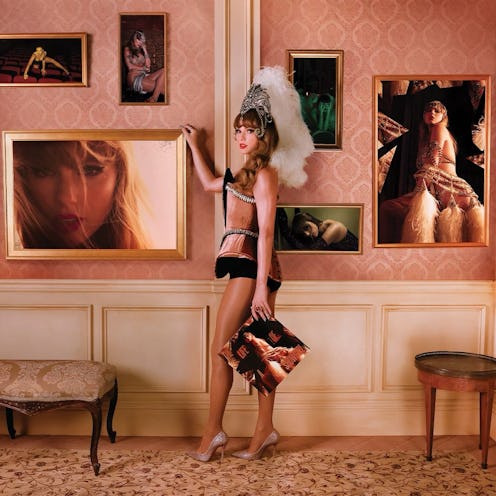Music
Taylor Swift's The Life Of A Showgirl Is Her Most Revealing Album Yet
She addresses her relationships with fame, Travis Kelce, and the music industry in ways she hasn’t before.

Since her debut in 2006, Taylor Swift has become revered for her exceptional storytelling. Over 11 studio albums, the singer has proven that she can make fleeting glances feel like a romantic fairytale and turn heartbreak into comforting catharsis. All the while, critics have claimed that the 35-year-old singer’s success stems from her relationships, many of which have played out in the public eye. After all, her experiences of falling in love, breaking up, and every phase in between inspired many of her biggest hits.
But her 12th studio album, The Life of a Showgirl, is arguably her most insightful and revealing effort yet. While her relationship with fiancé Travis Kelce might’ve inspired a number of the songs and lyrics, Swift seems much more concerned with reflecting on her career and life in the spotlight this time around.
It’s a side of Swift that listeners have only glimpsed before. Her music previously broached the downsides of fame, but only in small doses. On “The Lucky One,” from 2012’s Red, she tells the story of a legend who left it all behind for a life of solitude. Nine years later, she’d release a “From the Vault” track that didn’t make it onto the album, “Nothing New,” where she waxes poetic about the fear of fans moving on when a new generation of singer-songwriters comes along, a pattern she continues to explore on her 2024 track “Clara Bow.”
Now, in The Life of a Showgirl, she goes deeper, singing about feuding with her peers, wishing for privacy, and reclaiming control of her art, all while pondering whether it’s possible to remain grounded. In “Elizabeth Taylor,” for example, she channels the legendary actor’s glamour and sadness, relating to her struggles of being with men who couldn’t handle life in the spotlight.
“Father Figure” sees her step into the shoes of a former mentor who showed her the ropes of the music business, turning her own story into a Godfather-like narrative where loyalty is everything. In “Actually Romantic,” she finds a humorous new way to address her haters (rumored to be aimed at one artist in particular).
“Wi$h Li$t” is an undoubtedly fun and sparkly bop as the dollar signs suggest, as Swift disowns the material perks that come with fame and wishes for a couple of kids and a basketball hoop in their front yard. But underneath her proud declaration of love, there’s a sense of longing for a simple life, and questioning whether that kind of privacy is even possible at this point in her career.
In “CANCELLED!,” the singer analyzes cancel culture from a new perspective, looking outward to help friends and fans navigate it without dwelling too much on her own experiences. Unlike Reputation, where she addressed her public backlash with built-up vengeance, she now looks back on it with a mere eyeroll.
The Life of a Showgirl ends with its title track, which tells the story of a theatrical showgirl named Kitty, who thanks Swift for the “lovely bouquet” but warns that her life is not as glamorous as she makes it seem onstage every night. In true Swift fashion, she turns the narrative around by the end, becoming the showgirl who receives the bouquet and passes on her wisdom to the next generation, with newly minted pop star Sabrina Carpenter featuring on the song.
The song’s reflective wisdom shouldn’t come as a surprise. Swift has spent much of the past four years re-recording many of her studio albums and performing her entire catalog on the Eras Tour. This year, she acquired the masters of her first six albums after a years-long battle, meaning she now owns all of her music.
So, it’s only natural that Swift takes stock of her journey thus far, and you can hear it in the album’s soundscape. It combines the earworm melodies of 1989, the hard-edged defiance of Reputation, the character narratives of Folklore, and literary references from The Tortured Poets Department into one sharp and cohesive package.
By the end of Showgirl, Swift has come to terms with her fame, both the good it’s created and the harm it’s caused. Yes, she’s still talking about the haters, which might be tiresome, but she’s no longer the woman who questioned whether she can find love and settle down, like on her Folklore standout “peace.” She’s learned that she can, and with that comes a renewed confidence. She’s unafraid to let her guard down, directly referencing her life with her fiancé and addressing aspects of her fame without wrapping all of it up in metaphors (though she still uses plenty).
Now, Swift openly rejoices in building the best of both worlds, as seen with her openness and candor during the album’s promotional rollout. Her dream of a quieter life with her family is finally within reach — only without the expense of giving up the life of a showgirl.